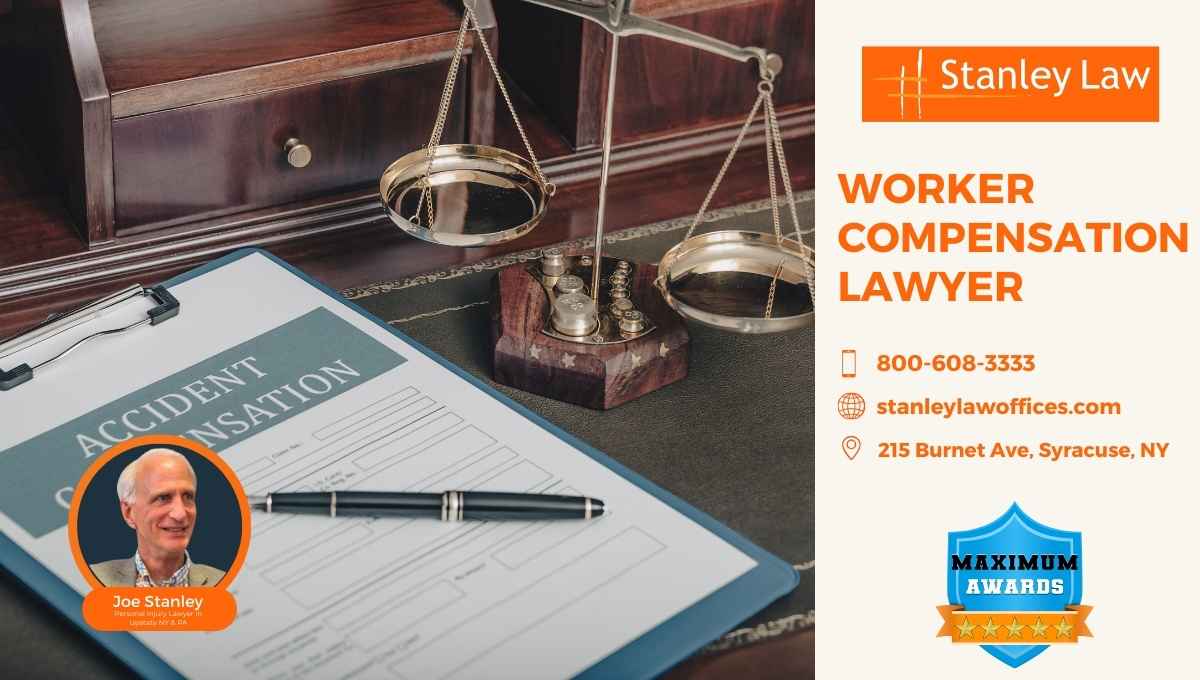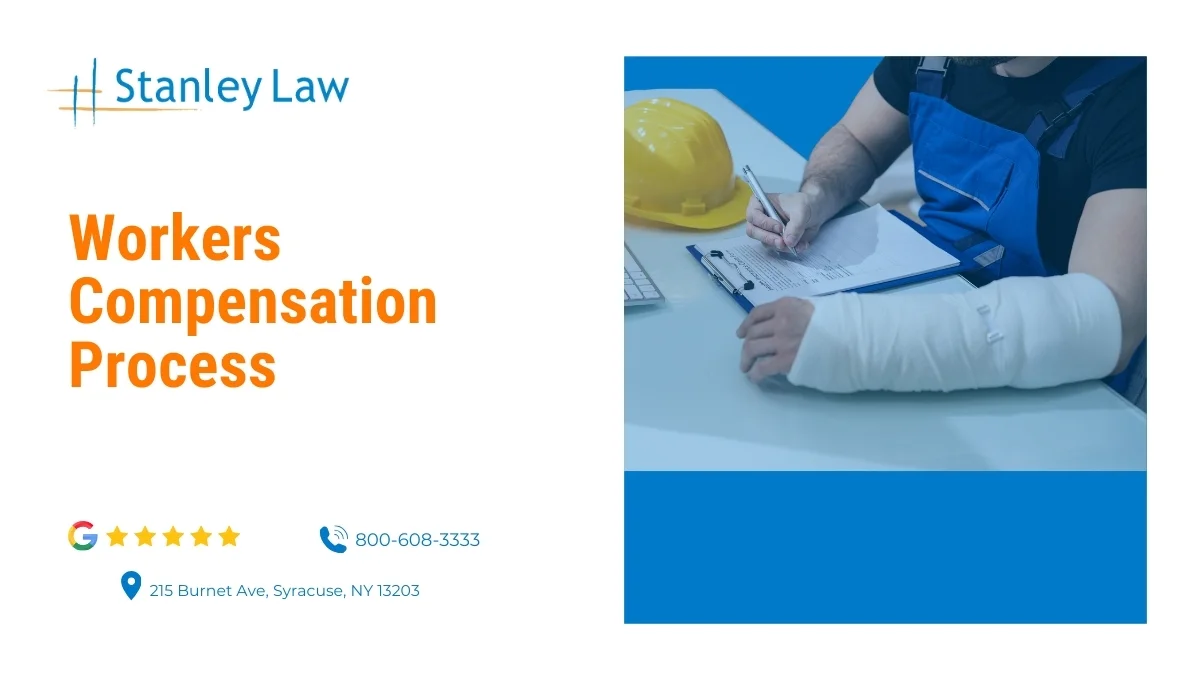Have you ever wondered how the workers’ compensation process works? Whether you’re an employee injured on the job or an employer dealing with a claim, the process can often seem hectic. With nearly 2.8 million non-fatal workplace injuries reported annually in the U.S., knowing how to file a claim and what steps to follow is crucial. This comprehensive guide will walk you through each phase of the process. We aim to provide clear, actionable advice to help you effectively file claims and address any challenges that may arise, ensuring a smoother experience for all parties involved.
Understanding Workers Compensation
Workers’ compensation plays a vital role in maintaining workplace safety and security. It provides essential support for employees injured or ill due to their jobs. By ensuring that those affected by workplace incidents receive the help they need, workers’ compensation creates a safer working environment and protects employers from potential legal claims.
What is Workers Compensation?
Workers’ compensation is an insurance program designed to assist employees injured or ill due to their job duties. This program covers medical expenses, rehabilitation costs, and a portion of lost wages, allowing workers to focus on their recovery without the added stress of financial burdens. Essentially, it acts as a safety net for those impacted by workplace incidents.
Why Workers Compensation Matters
Workers’ compensation is essential for several reasons, including:
- Employee Protection: Provides timely medical care and financial support for job-related injuries or illnesses.
- Financial Relief: Relieves the financial strain of unexpected workplace incidents.
- Safer Work Environment: Encourages employers to prioritize and maintain safer workplace conditions.
- Enhanced Productivity: Improved employee focus leads to greater overall productivity.
- Boosted Morale: A supportive system builds a sense of security among employees.
Key Roles in the Workers’ Compensation Process
Understanding who is involved in the workers’ compensation process is important. Each group has specific duties that help manage workplace injuries effectively.
Role of Employees
When employees get hurt at work, they need to:
- Report the Injury: Tell a supervisor or manager right away.
- Seek Medical Attention: Get medical care to document injuries and start treatment.
- Follow-up on Treatment: Attend all medical appointments and follow the doctor’s advice.
- Complete Necessary Paperwork: Fill out any required forms and keep records of everything.
- Stay Informed: Check on the claim status and stay in touch with their employer and insurance provider.
Role of Employers
Employers also have key responsibilities. They should:
- Report Claims: Immediately inform their insurance company about workplace injuries.
- Ensure Workplace Safety: Keep the work environment safe to prevent injuries.
- Cooperate with Insurance Companies: Work closely with insurers during the claims process.
- Follow State Laws: Abide by regulations regarding workers’ compensation.
Role of Insurance Providers
Insurance companies play a critical role in handling claims, such as:
- Process Claims: Review injury reports and documents from employees and employers.
- Review Documentation: Assess medical records and other evidence.
- Make Compensation Decisions: Decide on the compensation amount based on their review.
Role of Medical Providers
Medical professionals help by:
- Documenting Injuries: Record the details of the injuries in medical reports.
- Providing Treatment: Offer treatment to help employees recover and gather necessary documentation.
- Collaborating with Insurers: Communicate with insurance companies about the employee’s condition.
Role of Workers’ Compensation Attorneys
Workers’ compensation attorneys assist employees throughout the process by:
- Resolving Disputes: Help address any issues that arise during the claims process.
- Addressing Claims Denials: Guide on handling denied claims.
- Assisting with Appeals: Support employees in filing appeals against unfavorable decisions.
Filing a Workers Compensation Claim: Step-by-Step Process
Filing a workers’ compensation claim can feel oppressive, but knowing the steps can make it easier. Here’s a clear guide to help you through each step effectively.

Step 1: Report the Injury or Illness
Report your injury or illness immediately. Reporting is important to stay eligible for compensation and to document the incident. Delaying this can complicate your claim, as insurance companies may question late reports.
Step 2: Seek Medical Treatment
Get medical treatment for your health and your claim. Medical professionals will assess your condition and provide care. Their documentation will also serve as proof for your workers’ compensation claim.
Step 3: Notify Your Employer and Complete a Claim Form
After receiving medical care, inform your employer about your injury or illness. Fill out the required claim form carefully. This paperwork is crucial for processing your claim, so ensure all details are accurate and complete.
Step 4: Submit the Claim Form to Your Employer
Submit the completed form according to your employer’s instructions. Keep a copy for your records to track your claim’s progress. You can get the claim form from your employer or their human resources department.
Step 5: Insurance Carrier Reviews the Claim
After you submit your claim form, the insurance carrier will review it along with all documentation. This review may take some time, and the outcomes can vary.
Step 6: Receive the Claim Decision
Once the insurance company completes its review, you’ll receive a decision on your claim. This decision could be an approval, partial approval, or denial. If approved, you will begin receiving payments.
Step 7: Follow Up on Medical Treatment and Rehabilitation
Continue medical care and rehabilitation based on your doctor’s instructions. This follow-up treatment can help you regain strength and function.
Step 8: Appeal a Claim Denial
Appeal for claim denials; you have the right to do so. Start by reviewing the denial letter to understand the reasons. Follow the steps for the appeal process, paying attention to deadlines. Gather any supporting documentation to strengthen your case.
Step 9: Resolve the Claim and Return to Work
After a successful appeal or claim approval, focus on resolving the claim. Contact your employer about your return to work.
Common Challenges in Workers’ Comp Cases
Workers’ compensation claims often come with challenges. Here’s how to address some of the most common issues:
Claim Denials
There may be claim denials for several reasons, including:
- Incomplete Documentation: Missing medical records or incomplete forms.
- Late Reporting: Delays in reporting the injury can lead to denial.
- Pre-existing Conditions: Insurers may use prior health issues to deny a claim.
Delays in Processing
Processing delays can happen for a few reasons, such as:
- Incomplete Forms: Missing information can slow down your claim.
- Backlogs: Insurance companies may take longer due to a high volume of claims.
Disputes Over Medical Treatment or Compensation
Disagreements can arise over:
- Treatment Plans: Insurers might question whether certain treatments are necessary.
- Compensation Amounts: There can be disputes about how much you should receive.
Tips for a Smooth Workers’ Compensation Process
Here are some simple steps to help simplify your workers’ compensation claim:
Keep Detailed Records
Keeping thorough records is essential for a successful workers’ compensation claim. Document every medical treatment, doctor visit, and communication- related to your case. Save copies of all paperwork, emails, and letters exchanged with your employer and the insurance company. These records prove your claim and help avoid delays or disputes.
Communicate Effectively
Clear communication is just as important. Keep your employer updated on your condition and recovery status. Respond promptly to any requests from the insurance company. Make sure your healthcare provider knows about your claim and any work restrictions. Good communication helps the process move smoothly and prevents misunderstandings.
Know When to Seek Legal Assistance
Consider involving a workers’ comp attorney for:
- Claim Denials: A lawyer can review your case and handle appeals.
- Delayed Payments: An attorney can resolve payment delays.
- Disputes Over Treatment or Compensation: A lawyer can negotiate on your behalf.
Getting early legal advice can help protect your rights.
Why You Need a Workers’ Comp Lawyer?
Workers’ compensation cases can be complex. Having an experienced lawyer can make a big difference. Here’s why legal assistance is important for securing your rights.
How a Lawyer Can Help With Claims and Appeals
Workers’ comp lawyers can simplify the process and treat you fairly. They assist in:
- Filing Claims: Complete and submit forms accurately and on time.
- Gathering Evidence: Collect medical records and necessary documents to build a strong case.
- Appealing Denials: Manage the appeal process, meet deadlines, and prepare additional documentation.
- Negotiating Settlements: Work with insurers to secure fair compensation for you.
- Legal Representation: Represent you in court to protect your rights if needed.

When to Involve a Workers’ Compensation Lawyer
Hire a workers’ comp lawyer if your case involves:
- Complex Disputes: Get expert help for serious issues or benefit disagreements.
- Serious Injuries: Ensure you receive all entitled benefits for significant injuries.
- Appeals: A lawyer can manage the appeals process and meet important deadlines.
A lawyer helps protect your rights and resolve conflicts effectively.
Why Choose Stanley Law Office as Your Workers’ Comp Lawyer?
Stanley Law Office is a trusted partner for workers’ compensation cases. Here’s why you should choose our firm to represent you.
Expertise and Experience
With over 90 years of combined experience, Stanley Law Office has a strong track record of achieving favorable outcomes for injured workers. Our deep understanding of the workers’ comp process lets us handle your case skillfully, maximizing your chances of receiving the benefits you deserve.
Personalized Legal Representation
At Stanley Law Office, we provide personalized attention to every client. We take the time to understand your unique situation and tailor our legal strategy to fit your needs. Our commitment to clear communication means we never leave you in the dark and always protect your rights.

Conclusion
Dealing with the workers’ compensation process can be irresistible, but following the key steps can help protect your rights. If you face any challenges, don’t hesitate to seek legal assistance to secure the benefits you deserve. Stanley Law Office guides you through every step, ensuring you receive fair compensation for your injury.
Contact us for a free consultation today, and let us fight for your rights!
Workers Compensation Process: FAQs
How Long Does It Take for a Workers’ Compensation Claim to Be Approved?
Approval of a workers’ compensation claim usually takes 14 to 30 days, depending on the documentation’s completeness, the case’s complexity, and the insurance company’s current workload.
How Long Does It Take to Get Workers Comp in NY?
You can expect your first workers’ comp payment in New York about 14 days after your claim is approved. The total time from claim filing to receiving benefits can vary from weeks to months.
Learn more in our other blog, “How Long Do Workers Comp Settlements Take to Finalize?“
Can I Get Workers’ Compensation if the Accident Was My Fault?
Yes, you can. Workers’ compensation is a no-fault system. You can receive benefits regardless of who caused the job-related accident.
What Benefits Can I Receive From Workers’ Compensation?
You can receive the following benefits from workers’ compensation :
- Medical Expenses: Covers all necessary medical treatments.
- Wage Replacement: Compensates for lost wages.
- Disability Benefits: Provides for permanent or temporary disabilities.
- Rehabilitation Services: Offers physical therapy and job retraining.
- Death Benefits: Supports dependents if the injury results in death.
What is the Average Workers’ Compensation Settlement Amount?
In New York, the average workers’ compensation settlement amount ranges from a few thousand dollars to over $20,000. It greatly varies depending on the severity of the injury, lost wages, and medical expenses.
Can I Sue My Employer if I Accept Workers’ Compensation?
You usually can’t sue your employer after accepting workers’ compensation benefits. This system gives you financial support and protects your employer from lawsuits. However, you could sue if your employer intentionally caused your injury or a third party was involved.

